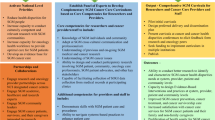Abstract
The Minority Training Program in Cancer Control Research (MTPCCR) encourages underrepresented master's level students and professionals in the social, behavioral, and public health sciences to pursue doctoral training and careers in cancer disparities research. This paper reports new data on the program outcome after 12 years. A web-based survey was sent to all 462 program alumni. The questions addressed current academic status and plans, job status and plans, research focus, and influence of the MTPCCR. The survey response rate was 79 %. Overall, 30 % of alumni are enrolled in or have completed doctoral programs; 88 % of whom report involvement in research related to cancer. Scaled and open-ended responses indicate a strong influence of the program on doctoral program enrollment and cancer focus. The MTPCCR model is successful because it targets underrepresented minorities who are capable of doctoral studies but have not yet chosen that path.
Similar content being viewed by others
Notes
We previously validated our measure of intention to apply among all alumni who were 5 years past their summer institute (n = 130). Testing their post-institute rating of intention to apply to a doctoral program (1–10 scale, 10 being strongly intend to apply), comparing those who enrolled and those who did not, the mean score of those who entered a doctoral program within 5 years was 9.4 vs. 8.0 for those who did not (p = 0.0003).
References
Smith BD, Smith GL, Hurria A, Hortobagyi GN, Buchholz TA (2009) Future of cancer incidence in the United States: burdens upon an aging, changing nation. J Clin Oncol 27(17):2758–2765
Haynes MA, Smedley B (eds) (1999) The unequal burden of cancer: an assessment of the NIH research and programs for ethnic minorities and the medically underserved. Institute of Medicine/National Academy, Washington, D.C
Koh HK (2009) Toward the elimination of cancer disparities. Springer, New York
Warnecke RB, Breen N, Gehlert S, Paskett E (2008) Approaching health disparities from a population perspective: the National Institutes of Health Centers for Population Health and Health Disparities. Am J Public Health 98:1608–1615
Shavers VL, Fagan P, Lawrence D, McCaskill-Stevens W, McDonald P et al (2005) Barriers to racial/ethnic minority application and competition for NIH research funding. J Natl Med Assoc 97(8):1063–1077
Ginther DK, Schaffer WT, Schnell J, Masimore B, Liu F, Haak LL, Kington R (2011) Race, ethnicity, and NIH awards. Sci 333:1015–1019
National Academy of Sciences, National Academy of Engineering, and Institute of Medicine (2011) Expanding underrepresented minority participation: America's Science and Technology Talent at the Crossroads. The National Academies, Washington, D.C
National Institute of General Medical Sciences (2010) Examples of NIGMS-funded NRSA training programs with notable records of diversity recruitment and retention. http://www.nigms.nih.gov/Training/Diversity/Examples.htm#3. Accessed 14 Sep 2011
Association of Schools of Public Health (2009) Annual data report. http://www.asph.org/UserFiles/Data%20Report%202009.pdf. Accessed 21 May 2010
Pasick RJ, Otero-Sabogal R, Nacionales MCB, Banks PJ (2003) Increasing ethnic diversity in cancer control research: description and impact of a model training program. J Cancer Educ 18(2):73–77
Yancey A, Kagawa-Singer M, Ratliff P, Valdez A, Jiménez L et al (2006) Progress in the pipeline: replication of the Minority Training Program in Cancer Control Research. J Cancer Educ 21(4):230–236
Acknowledgments
This program is funded by National Cancer Institute, grant # 5R25CA078583. We would like to thank all our alumni for their responsiveness to our data requests and support of the program.
Author information
Authors and Affiliations
Corresponding author
Electronic supplementary material
Below is the link to the electronic supplementary material.
ESM 1
(PDF 132 kb)
Rights and permissions
About this article
Cite this article
Pasick, R.J., Kagawa-Singer, M., Stewart, S.L. et al. The Minority Training Program in Cancer Control Research: Impact and Outcome Over 12 Years. J Canc Educ 27, 443–449 (2012). https://doi.org/10.1007/s13187-012-0375-7
Published:
Issue Date:
DOI: https://doi.org/10.1007/s13187-012-0375-7




